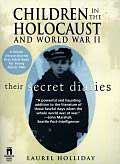 The book is Children in the Holocaust and World War II: Their Secret Diaries. Edited by Laurel Holliday.
The book is Children in the Holocaust and World War II: Their Secret Diaries. Edited by Laurel Holliday.It is a chilling, moving, important account of 23 youth and youngsters trying to understand the hatred and violence that engulfs their previously peaceful lives. The average age of the writers is around 13-14 years.
For many of these children, these excerpts represent their final plea to the surviving world, fully understanding that they will not be a part of that world. Writing became their last and sometimes only form of resistance.
I found the very last entry of the unknown brother and sister in the Lodz ghetto to be especially moving. Without access to any other paper, the boy scrawled his diary entries into the margins of an old French novel. After the war was over, a next door neighbor returned to the wreckage of the house, and found the book with the boy's notes in it.
If any one of us actually knew any one of those who wrote these diaries... if any one of them were a member of our own families, we would naturally value even one of their retrieved pages far above all of the other books we own, would we not?
Well, as I read this book I realized many times that just because I did not personally know any of these children does not really diminish the inherent importance of any one of their pages... these children were all known and loved by their own families and friends. They should have been loved by those who were then acting as their mortal enemies, but sadly, they were not.
Some of these entries depict deprivations and describe atrocities that are near impossible for most of us today to imagine.
Some would avoid the book on account of this, and that is understandable. We can go to horror novels to be deliberately horrified in a fictional sense, but it seems morbid to turn to non-fiction for the same results.
But we must remember that we do not read non-fiction for the same reasons that we read fiction. We read non-fiction, not to dwell on or glory in horror, but to LEARN something about ourselves and others. There is an old saying, "To dwell on history is to lose an eye; to ignore it is to lose both of them."
Laurel Holliday has here edited a book which should not be ignored.
************
No comments:
Post a Comment